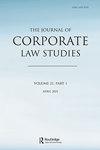The relevance of public law to private ordering: the consequences of uncertain judicial review for stock exchange self-regulation
IF 1.5
4区 社会学
Q1 LAW
引用次数: 1
Abstract
ABSTRACT Self-regulation relies on private ordering, whereby private actors make and enforce rules governing their conduct. Private ordering is not outside the reach of public law principles, making the certainty of private ordering dependent on the predictability of whether public law principles apply. This article examines the London Stock Exchange's self-regulation of AIM (Alternative Investment Market), arguing that doctrinal uncertainty over the availability of judicial review undermines private ordering by hindering informed ex ante bargaining and contracting. Public law uncertainty imposes transaction costs on self-regulatory actors who must reappraise or revise their contracts to account for unpredictable public law obligations, such as when the LSE doubled the length of the AIM Disciplinary Handbook in 2018 following an unsuccessful claim for judicial review. This article concludes that regulation on AIM is not likely sufficiently public to be amenable to judicial review, which would increase certainty of contracting in the financial system.公法与私人命令的相关性:证券交易所自律不确定司法审查的后果
自律依赖于私人秩序,私人行为者据此制定并执行管理其行为的规则。私人秩序并不超出公法原则的范围,这使得私人秩序的确定性取决于公法原则是否适用的可预测性。本文考察了伦敦证券交易所对另类投资市场(AIM)的自我监管,认为司法审查可用性的理论不确定性阻碍了知情的事前谈判和合同,从而破坏了私人秩序。公法的不确定性给自律行为体带来了交易成本,他们必须重新评估或修改合同,以应对不可预测的公法义务,例如伦敦政治经济学院在2018年将AIM纪律手册的长度增加了一倍,因为司法审查申请不成功。这篇文章的结论是,对AIM的监管可能不够公开,不足以接受司法审查,这将增加金融系统中合同的确定性。
本文章由计算机程序翻译,如有差异,请以英文原文为准。
求助全文
约1分钟内获得全文
求助全文

 求助内容:
求助内容: 应助结果提醒方式:
应助结果提醒方式:


